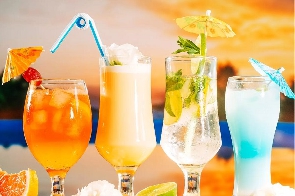Di World Health Organization (WHO) don call on governments around di world to increase di tax on alcohol and sugar-sweetened beverages - soft drinks (SSBs).
Di health body say dis na to reduce di number of pipo wey dey die sake of say dem take dis drinks wey dem claim say dey unhealthy.
On Tuesday, di WHO release one new data wey show say di average global tax rate on “unhealthy products” like alcohol and soft drinks dey very low.
According to di WHO, 2.6 million pipo die from drinking alcohol and 8 million people die sake of unhealthy diets every year, every year.
Di UN health agency believe say higher taxes go help reduce consumption of di products and e go make companies produce healthier products.
One 2017 study show say taxes wey increase di price of alcohol by 50% go help prevent ova 21 million deaths ova 50 years plus e go generate nearly $17trillion in additional revenues.
“Taxing unhealthy products go create healthier populations. E get possible ripple effect across society, less disease and more revenue for governments to provide public services,” WHO Health Promotion Director, Rudgier Krech tok.
She add say increase in tax for alcohol go also help prevent violence and road traffic injuries.
Di WHO add say while 108 of dia 194 member states don already compulsory some taxes on SSBs, dem account for an average of just 6.6% of di price of soda.
Half of those kontris, di WHO note say dey also tax water, wey no dey recommended by di UN agency.
WHO: Less cheap booze mean fewer alcohol-related deaths
Di UN health agency tok say raising taxes on drinks like soda go reduce di consumption and health challenges like heart disease, stroke, diabetes, cancer, teeth cavities, among odas go reduce.Think again if you guzzle soda and other sugary drinks. The beverages you consume can have a serious impact on your health.
Only 108 countries have taxes on sugar-sweetened beverages and they don’t even include all types! Raising taxes on drinks like soda decreases consumption… pic.twitter.com/Ap8q96CjyL
— World Health Organization (WHO) (@WHO) December 5, 2023
WHO say minimum pricing alongside taxation fit reduce consumption of cheap alcohol and reduce drink-related hospitalizations, deaths, traffic violations and crimes.
"A significant body of research don show say pipo wey dey drink well-well dey drink di cheapest available alcoholic beverages," di WHO tok.
"However, at least 22 kontris no put excise tax on wine, most of dem dey di European region."
Alcohol taxes dey hit di poorest more?
Globally, on average, di tax on top di price of di brand of beer wey dey sell pass na 17.2%, while for brand of spirits wey dey sell pass na 26.5%, WHO report.Di drinks industry dey often tok say alcohol taxes dey affect di poorest communities pass, di WHO bin counter am and tok say view dey ignore di "disproportionate harm per litre for alcohol consumers in lower socioeconomic groups."
"A pressing concern na say alcoholic beverages, over time don consistently become more affordable," WHO Assistant Director-General Ailan Li tok. "But dem fit reduce di increasing affordability by using a well-designed alcohol tax and pricing policies."
Calorie wey dey for soft drink
For 2015, one report wey dem publish for medical journal, di Lancet find out say Americans dey get average of 157 calories a day from sugary drinks - dis one dey little more than one can of cola per day.330ml can of Coca-Cola, according to the company website, get 35g of sugar, wey amounts to about seven teaspoons. Di World Health Organisation (WHO) recommend say di amount of sugar wey pesin need to take a day no suppose pass 50g.
But di US no be even di worst kontry for di time di Lancet report come out.
Chile dey average of 188 calories a day per pesin, although dat na before di kontri sugar tax begin. Di tax come help reduce di everi month taking of soft drink by ova 21%.
Nearly 30 kontries around di world, including UK, don put some kain tax on top sugary drink.
One of di main concern for health authorities na di way wey sugary drinks dey affect children and teenagers.
WHO tok say obesity numbers for dis age groups (between 5 to 19) don increased from 11 million for 1975 to 124 million for 2016,
But as recent research don tok, over drinking of sugary drinks fit get even more dangerous effects.















